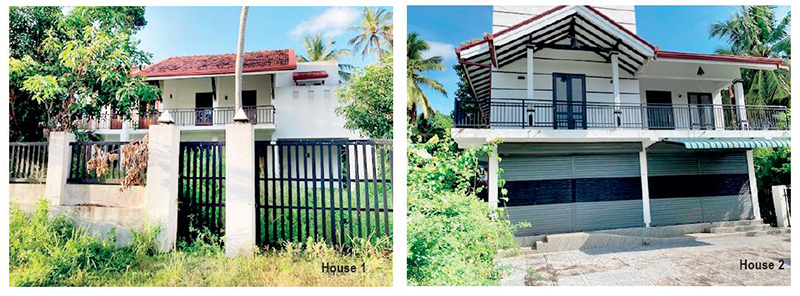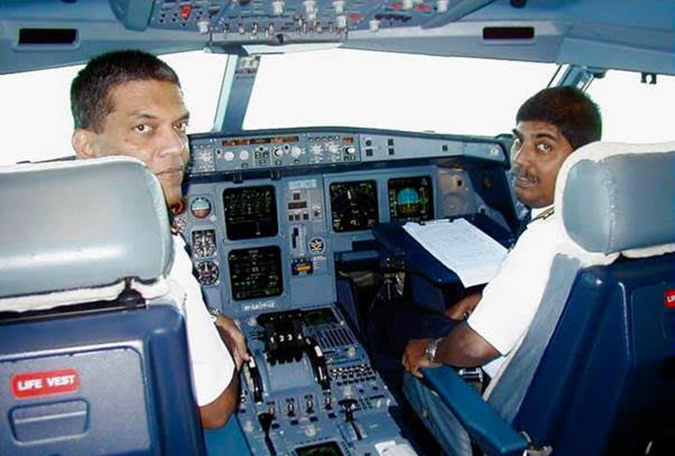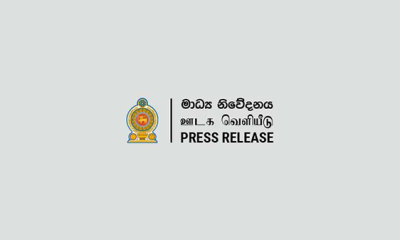Features
Exodus to Italy and its consequences

BY GEORGE BRAINE
My village, Boralessa, is only 40 km from Colombo. Starting with my paternal grandmother, our family has resided at Boralessa for well over a century. My modest ancestral property, “Pondside,” was previously owned by my grandmother, an uncle, and an aunt. It has been mine for nearly fifty years. Most probably, I’ll be the last Braine to live there.
About 95% Sinhala Catholic, the villagers used to be masons, carpenters, sawyers, and workers in tile factories and brick kilns. Over the years, as the population grew, the large coconut plantations that surrounded the village were divided and sub-divided for distribution among landless villagers. Gradually, these plots have been reduced to only 10 perches.
The “Italians”
About forty years ago, looking for work, villagers began to travel to Italy, first illegally (on jam-packed, rickety fishing trawlers, and later with forged passports), then by legal means through family connections. Almost every household now has a parent, a child, or a relative living and working in Italy. Most work as carers for the elderly, shop assistants, farmhands, and in logistics. Many have gained citizenship there. Routinely, they would visit Boralessa for events like the annual church feast. They stood out for their flashy clothes and lavish spending and were referred to as Ithali karayo (Italians).
As they accumulated wealth abroad, they needed tangible evidence to show the villagers their good fortune. So, they began to build houses, not just ordinary homes, but extravagant multistoried structures with gabled roofs, parapet walls, and massive gates. The construction would stretch over several years. First, a plot of land was bought. On the next visit, a parapet wall was built, along with the massive, elaborate gate, referred to as an “Italian gate”, that signified the owner’s affiliation to Italy. Building the foundation was the next step, followed by the walls and the roof. I have observed the entire construction taking seven years or more.
Usually, the elderly parents of the owners would reside in the backroom of the house. Cash, and gift boxes containing chocolates, pasta and other Italian items, would be sent regularly to these people. They may have missed their children but were well taken care of. The annual visits of the relatives from Italy was a time to celebrate and enjoyed by all.
Pandemic and Bankruptcy
Even before the pandemic arrived, this smooth arrangement ceased to function at some houses. The elderly parents or relatives who had been caretakers began to die off, mainly of old age. The pandemic, which caused travel restrictions, only exacerbated the problem. Boralessa’s population being depleted due to so many villagers being abroad, there simply was no one to take care and maintain these houses. That’s when I began to notice a marked shift in their appearance.
The front yards became overgrown with weeds and the once pristine outer walls began to show streaks of black mold, sure signs of a neglected house. The gates were firmly padlocked, and the iron frames showed signs of rust. Roof tiles, also moldy, showed damage from falling coconuts or coconut fronds. No lights came on at night.
Annual visits by “Italians” became irregular or stopped altogether. Travel, with broods of children or grandchildren, had become expensive. Instead of building and maintaining houses in Boralessa, they began to purchase property in Italy. A neighbour, after more than 30 years in Italy, bought a house in Italy only last year.
I live in Kiragara Road, which begins at Boralessa junction and runs through the village for a few kilometers. Within a 200-meter radius of my house are four abandoned structures, and two can be seen in the photographs. If I walk down the road for about a kilometres, I can count more than ten abandoned houses.
The first house below was built about six years ago. Two storeyed, built along sleek modern lines sans multiple gables, the house was visited by the owner’s family only once. Behind the iron and concrete fence, the front yard is covered in weeds. The tiles show signs of mold.
The second photo is what could be termed a shophouse, with accommodation for the owner on the upper floor. Built for a tailoring business about five years ago, it attracted a good clientele for about two years before the pandemic hit. When business declined, the seamstress who ran it returned to Italy, perhaps permanently.
One of the neighborhood boutiques sillara kade, which had operated for as long as I have been in the village, closed when the family went abroad. It is very unlikely that it will open again.
Other consequences
The pandemic and the bankruptcy that came on its heels hit Boralessa hard. As the “Italians” stopped visiting, less money began to circulate in the village. Building construction stopped, throwing masons and carpenters out of work. rata yanda (go abroad) was the obvious solution.
And they left in droves. Italy was the prime target because relatives and friends there could help one to find work and settle down, even if one had entered illegally. Romania began recruiting workers in Sri Lanka, and, apparently, the route from Romania to Italy could be easily traversed. Amazingly, tiny Malta (120 sq. miles; 550,000 population) also became a draw because the route to Italy was only a ferry ride. So many Sri Lankans were applying for visas to Malta that an honorary consulate was opened in Colombo.
Let me cite two instances of neighbours emigrating recently. One, to escape her abusive husband, went to Romania as a seamstress, although she had never stitched anything in her life. She took her grown up daughter with her. Within three months, she had entered Italy, illegally.
Sriyani, my caretaker at “Pondside,” whose husband died of covid three years ago, has a 23-year-old son. I found him work at a nearby electronics factory, but the Rs. 35,000 monthly salary did not attract him. The young man had also been bitten with the rata yanawa fever, and, after a year of trying, he managed to obtain a visa to Malta, paying a Sri Lankan there Euro 5000, wiping out the family’s savings. He left for Malta three weeks ago, and his mother had to remit another Euro 500 after he landed. She is heavily in debt now. Lakshman’s job is to assemble pantry cupboards at salary of Euro 1000 per month, minus rent, health insurance, travel, and other miscellaneous expenses.
The consequences of this exodus on the village have been drastic. Working age men, and to some extent women, are in short supply. Skilled craftsmen – electricians, plumbers, welders, mechanics – are near impossible to find. A pall of gloom seems to hang over the village. While at “Pondside”, I love to watch the world go by, sitting on my verandah with a direct view of Kiragara Road. Once busy – with schoolchildren and office workers (on their way to the railway station) in the morning, housewives walking or riding to the market later on, idle young men roaring by on their motorbikes, tuk tuks, the occasional car or lorry – the road traffic has diminished greatly. Instead of three chuun paan men, only one plies Kiragara Road now. Most customers were gone.
Boralessa has changed, and it may be a microcosm of what is happening to some other villages and towns in Sri Lanka.
Features
Chira flew west

By Capt. Gihan A Fernando
Chira flew west two weeks ago.
Chira to me was my Punchi Aiya. He was almost three years older than I was.
He was always happy and content, quietly concentrating on his hobbies like building aircraft models and reading.
I was always his helper (help karaya) and had to go at his behest, out to the hardware store a buy the sandpaper, glue, plastic wood and paint needed for his work.
One incident which may give some insight into his teenage years may be how we were selected for the Physical Training (PT) competition in our respective school houses, at S. Thomas’ College were taking the CTB bus, in spotless white uniforms. While getting into the bus, it pulled off before I could get in. Being the elder brother, he had the bus fare for both of us. So, he jumped out from the moving bus without thinking twice. As a result, he went rolling on the ground, making his white kit a dusty brown. Fortunately, there were no injuries. He didn’t complain and brushed off the dust to the best of his ability. Got into the next bus to Mount Lavinia, this time with me safely on board. I am sure he would have got a ticking off for his trouble by his house master.
As long as I remember he always wanted to fly. As an elder brother, he fired my imagination, too, but knew our parents couldn’t afford to spend fifty rupees an hour of flying training in the Ceylon Air Academy at Ratmalana.
After his GCE A/Levels he joined the Colombo University, from where he was selected by the Air Force (RCyAF).
A few months after he was recruited to the Air Force as a cadet engineer, the Civil flying training costs were subsidised by the then Government and became more affordable.
That was how I decided to be a commercial airline pilot. When Chira changed his branch to a General Duties Pilot in Cranwell, England, my mother couldn’t say no to me.
After commencing flying lessons at Ratmalana, in 1971, I joined the Volunteer Air Force.
Chira and I flew many times together in the Air Force and later in Air Lanka and Singapore Airlines (SIA).
He was a natural pilot and an excellent Flight Instructor. We flew together many times and shared a few close calls like being upside down over oil tanks at China Bay at less than 500 ft off the ground!
Fortunately, our mother never found out.
In fact, when my mother flew once or twice to London, later on, Air Lanka, on her way to USA, we would arrange that I fly her from Colombo to Dubai and Chira would fly from Dubai to London or vice versa. I am sure that made her proud.
We trained together in Toulouse South of France on the Airbus A320
At one time he was Manager Flight Operations in Air Lanka and I was Secretary of the Pilots’ Guild, Sri Lanka.
Some even said that although the Wright brothers invented the airplane, the wrong brothers joined Air Lanka.
He retired at a mandatory age of 60 years, but continued training pilots in Singapore and Colombo.
He was good and caring brother.
May his soul Rest in Peace and Rise up in Glory !
Features
Navigating Climate Change: Urgent need for sustainable solutions in Sri Lanka

by Amarasiri de Silva
(International Day for Disaster Risk Reduction was observed on October 13.)
As a child, I found great comfort in the rhythmic sound of raindrops falling on the roof of our house during the monsoon months. The steady drumming of rain lulled me to sleep, and the cool, refreshing nights brought a sense of peace. The rain was a predictable companion, arriving on schedule and nourishing the earth. Back then, I developed a deep appreciation for the monsoon rains, its rhythm, and the life it brought to the land.
However, the patterns I grew up with have completely changed. What was once a soothing and life-giving force has become a symbol of unpredictability and destruction. People no longer welcome the rain with the same sense of comfort or security. Now, we are faced with devastating floods that erode the land, destroy homes, and sweep away carefully cultivated crops. These floods no longer follow the seasonal monsoon cycle; they happen throughout the year, with little warning or consistency.
News reports are now filled with images of flooding. We hear constant stories of entire communities being inundated, homes submerged, and people displaced. The once predictable and calming rain has become a source of anxiety and fear for many, as they brace themselves for its unpredictable wrath. The rhythm of raindrops on the roof has been replaced by the harsh reality of climate change and its far-reaching impacts on our lives. We hear new concepts like atmospheric rivers which we did not hear before they are a key part of the global water cycle and can often have hazardous effects.
As an island nation, we Sri Lankans are particularly vulnerable to the devastating effects of climate change, more so than many non-island nations. Its geographical position exposes it to rising sea levels, increasing temperatures, unpredictable weather patterns, and natural disasters, all of which are being intensified by global climate change. The island’s vulnerability is further heightened by its reliance on a land-based economy, with agriculture forming the backbone of livelihoods for many communities across the country. As a result, climate change poses a profound threat to the economic stability, food security, and well-being of the Sri Lankan population.
Sri Lanka’s agricultural sector, which employs a significant portion of the population and contributes considerably to the national economy, is particularly sensitive to climatic shifts. Agriculture in the country is heavily dependent on monsoonal rainfall, which has become increasingly erratic due to climate change. The once predictable seasonal patterns are being disrupted, leading to periods of intense drought followed by extreme rainfall, both of which are detrimental to crop production. Major crops such as rice, tea, and rubber are at risk of reduced yields, which would not only impact the livelihoods of farmers but also the nation’s food supply and export revenues.
The rural communities that rely on subsistence farming are especially at risk. Many of these communities are located in areas prone to flooding or drought, and they lack the resources to adapt to these rapidly changing conditions. Prolonged droughts threaten water availability for irrigation, while extreme rainfall can cause soil erosion and flooding, destroying crops. Additionally, increasing temperatures may push certain crops, such as tea, past their tolerance thresholds, further exacerbating economic hardship.
Coastal communities are also at the frontline of climate change. Rising sea levels, coupled with more frequent and intense storms, threaten to inundate low-lying areas, displacing populations and destroying infrastructure. Fishermen, who rely on coastal ecosystems for their livelihoods, are facing declining fish stocks due to warming ocean temperatures and coral reef degradation. These combined challenges further strain local economies, leading to potential migration crises and social unrest sometimes reflected as ethnic unrest as communities are forced to relocate or adapt to dwindling resources.
Given these looming threats, the Sri Lankan government must take decisive and proactive measures to mitigate the effects of climate change. It is critical that the government recognizes the gravity of the situation and develops comprehensive, long-term strategies to protect the country’s most vulnerable communities and industries. A multi-faceted approach is needed, combining climate-resilient agricultural practices, infrastructure improvements, and community education on adaptive strategies.
Investments in sustainable farming methods, such as drought-resistant crops, rainwater harvesting systems, and efficient irrigation technologies, can help safeguard agricultural production. Furthermore, improving early warning systems and disaster preparedness can help mitigate the impact of extreme weather events on both rural and coastal communities. Equally important in the fight against climate change is the protection and restoration of natural ecosystems such as mangroves and coral reefs. These ecosystems play a crucial role in acting as natural buffers against storms, coastal erosion, and rising sea levels. Mangroves, in particular, serve as a protective barrier along coastlines, absorbing the impact of waves and reducing the intensity of flooding during storms. Coral reefs also play a significant role by providing habitats for marine life and protecting shores from the full force of ocean waves.
It is disheartening, however, to witness the large-scale destruction of these vital ecosystems. Mangroves, like those in Muthurajawela, are being cleared out, often for short-term economic gain, without a clear understanding of the critical role they play in safeguarding coastal communities. The lack of awareness about the ecological importance of mangroves leads to their removal, which in turn increases the vulnerability of coastal areas to the impacts of climate change. This destruction not only exacerbates flooding and coastal erosion but also threatens biodiversity and the livelihoods of those dependent on these ecosystems.
As an island nation with a land-based economy, Sri Lanka is particularly susceptible to the compounded effects of both natural and man-made disasters. Deforestation, particularly the clearing of jungles, like Singha Raja is a major man-made contributor to the intensification of climate change. The widespread clearing of forests for agriculture, development, or other purposes reduces the land’s ability to absorb carbon dioxide, accelerates soil erosion, and disrupts water cycles. This exacerbates the frequency and intensity of climate-related events, such as floods and droughts, which have devastating consequences for the country’s agricultural productivity and overall stability.
The government must act swiftly to address these challenges by implementing forward-thinking policies that enhance the resilience of the country’s agricultural sector and protect its coastal regions. By doing so, Sri Lanka can reduce the potential economic and social disruptions caused by climate change and ensure a sustainable future for its people.
As the world continues to grapple with the reality of climate change, it becomes increasingly evident that the experience of global warming is not uniform across regions. Many characteristics of climate change are directly linked to the level of global warming, but the impacts that individuals and communities face vary significantly from global averages. For instance, warming over land is higher than the global average, and in certain regions like the Arctic, temperatures are rising at more than twice the global rate. These regional disparities highlight a key issue: while climate change is a global phenomenon, its effects are felt locally and often disproportionately.
The Intergovernmental Panel on Climate Change (IPCC) has long emphasized that climate change is already affecting every region on Earth in multiple ways. As Panmao Zhai, Co-Chair of the IPCC Working Group I, pointed out, “The changes we experience will increase with additional warming.” This statement underscores the fact that the consequences of climate change are not static; rather, they will intensify as global temperatures continue to rise. These changes are already reshaping ecosystems, economies, and societies around the globe, and their impacts are expected to become even more severe in the coming decades.
The IPCC’s latest report projects that climate changes will increase in all regions. At 1.5°C of global warming, we can expect to see a rise in the frequency and severity of heat waves, longer warm seasons, and shorter cold seasons. These changes may seem minor in isolation, but collectively, they represent a profound shift in the Earth’s climate systems. For instance, longer warm seasons and more frequent heat waves can lead to increased evaporation, drying up water sources that are critical for agriculture and human consumption. This, in turn, has far-reaching implications for food security, public health, and economic stability. At 2°C of global warming, the situation becomes even more precarious. Heat extremes will more frequently exceed the critical tolerance levels for both agriculture and human health. For farmers, this means that crops will struggle to survive in the face of extreme heat, fast spreading of weeds, fungi and pests, potentially leading to widespread food shortages. Similarly, human health will be compromised as higher temperatures contribute to heat-related illnesses, exacerbate existing health conditions, and place additional stress on healthcare systems, particularly with the growing incidence of mosquito-borne diseases. The risk to both agricultural sustainability and human well-being increases exponentially as the planet warms, highlighting the urgency of mitigating climate change.
However, the conversation about climate change cannot be limited to rising temperatures alone. Another critical issue that deserves attention is the widespread use of chemicals in agriculture. With the advent of the Green Revolution after 1964, Sri Lanka underwent a significant transformation in its ecosystem, particularly affecting aquatic systems. The push for high-yield agricultural practices during this period dramatically altered traditional farming methods and, in the process, disrupted delicate ecological balances.
As a child, I recall seeing tiny species of singing birds, such as sparrows, which were once a common sight. However, as I grew older and entered adulthood, these birds seemed to disappear from our villages. Similarly, the vibrant populations of small fish, like Thiththya, Dandi, and Bulath Hapaya, which once thrived in the streams winding through paddy fields, have all but vanished. These changes were not coincidental but were directly tied to the shifts in agricultural practices driven by the government’s focus on increasing food production, particularly rice.
To meet the growing demands of an expanding population, the government aimed to create a paddy economy that favored monocrop farming, replacing traditional subsistence farming systems. In the past, farmers cultivated a variety of crops, including vegetables, tree crops, and traditional rice varieties, providing diversity in both food supply and agricultural practices. However, the new paddy economy centered on high-yield rice varieties that required intensive cultivation methods, drastically altering traditional farming landscapes.
The introduction of these high-yield varieties necessitated the extensive use of chemical fertilizers to boost production, alongside weedicides to control weeds and pesticides to combat pests. These chemicals, while essential for sustaining the new farming model, brought with them a range of unintended and harmful consequences. One of the most alarming effects has been the pollution of shallow well water, which had served as the primary source of drinking water in many rural villages for centuries. The contamination of water sources with chemical residues has not only damaged the local ecosystems but also posed severe health risks to local populations.
The consumption of polluted water has led to a rise in health issues, particularly chronic kidney disease, in the dry zone districts of Sri Lanka. This health crisis has become a significant concern not only in Sri Lanka but also in other South Asian countries and parts of South America, where similar agricultural practices were adopted. The heavy reliance on chemical inputs in farming has proven to be a double-edged sword—while it has helped increase food production, it has also contributed to long-term environmental degradation and public health crises.
The climate change brings with it a myriad of other changes that vary from region to region. These changes include shifts in wetness and dryness, alterations in wind patterns, the melting of snow and ice, and changes to coastal and oceanic systems. Some regions will experience heavier rainfall and flooding, while others will face prolonged droughts. The loss of snow and ice in polar regions, particularly in the Arctic, will have cascading effects on global weather patterns, influencing everything from ocean currents to storm intensity.
Rising sea levels, driven by the melting of ice sheets and glaciers, threaten to inundate coastal communities, displace millions of people, and cause significant economic losses. In addition, changes to ocean systems, including warming waters and shifts in currents, will affect marine ecosystems and the livelihoods of those who depend on them, particularly in small island nations and developing coastal regions. These regions are often the least equipped to deal with the consequences of climate change, further exacerbating global inequalities.
While global warming is often discussed in terms of averages, the reality is that the impacts of climate change are far more complex and varied across regions. Warming over land is more intense than the global average, and the Arctic is experiencing warming at more than twice that rate. These differences illustrate that the experience of climate change is not the same for everyone. As the IPCC report highlights, the world is already witnessing the effects of climate change in every region, and these changes will only intensify as the planet continues to warm. Beyond rising temperatures, climate change is causing shifts in wetness and dryness, winds, snow, ice, coastal systems, and oceans, all of which are creating a more unstable and unpredictable future. Addressing these challenges requires urgent global cooperation, adaptation, and mitigation strategies to protect vulnerable communities and ecosystems worldwide.
Sri Lanka’s vulnerability to climate change, combined with the ecological and health impacts of human activities such as chemical-intensive agriculture, underscores the urgent need for comprehensive action. Climate change is exacerbating these challenges by intensifying extreme weather events, disrupting ecosystems, and placing additional strain on the nation’s natural resources. The shift towards monocrop farming and the excessive use of chemicals has compounded the effects of climate change, damaging ecosystems, contaminating water sources, and contributing to health crises like chronic kidney disease. As an island nation with a land-based economy, Sri Lanka must focus on both mitigating climate change and adopting sustainable agricultural practices to protect its ecosystems and communities. By doing so, the country can build resilience to climate change’s escalating effects and safeguard its future. We hope the new government will take the necessary steps to address these pressing issues.
Features
Where have our ethics gone?

“A man without ethics is a wild beast let loose upon this world.”– Albert Camus –
(Address to the Ceylon College of Physicians, 19 September, 2024, Colombo, Sri Lanka)
 You might wonder why a scholar would opt to ask a question as seemingly banal and commonsensical as ‘where have our ethics gone’ when you, as the Ceylon College of Physicians, and others, are here to deliberate on your own intellectual, research and policy quests focused on the theme, ‘Diversity, Inclusivity and Equity.’ When I was asked to speak at this event, I was, at the same time, impacted by a serious personal crisis.
You might wonder why a scholar would opt to ask a question as seemingly banal and commonsensical as ‘where have our ethics gone’ when you, as the Ceylon College of Physicians, and others, are here to deliberate on your own intellectual, research and policy quests focused on the theme, ‘Diversity, Inclusivity and Equity.’ When I was asked to speak at this event, I was, at the same time, impacted by a serious personal crisis.
It was obvious to me that it would be impossible to deal with my crisis without considering the implication of ethics and its absence in the broader sense. After all, my former university was censuring me for standing up for something I considered was a fundamental body of ethics: freedom of thought and expression on the one hand, and academic freedom on the other. The compromise of these ethics took place in a situation my former superiors and colleagues thought they should be seen as the guardians of what they thought were the interests of the state – in this instance, India. Hence, setting out from how ethics were both impacted and compromised in this situation, and reflecting further, it became abundantly clear that without serious consideration of ethics, you, as a group of professionals, would also not be able to work in your profession, and all of us would also not be able to collectively imagine our futures as a civilization.
The world we are used to and our taken-for-granted comfort zones in it would be in crisis if we moved too far away from our commitment to what we used to call ethics. And to reiterate, I was reflecting upon this in both personal and public contexts where ethics, as I thought I understood them, had become very distant from work and life. It is in explaining this general situation that John Berger has noted, “without ethics, man has no future. This is to say, mankind without them [ethics] cannot be itself.
Ethics determine choices and actions and suggest difficult priorities.” I have referred to ethics as ‘what we used to call ethics.’ This is a very conscious choice of words on my part. And this is because ethics in the way we used to understand them in the not-so-distant past that are still remembered by my generation and practiced by my parents until they passed on, is not how ethics are understood or practiced today. Often, it seems to me ethics is looked down upon as a reflection of foolishness and naivety, and, therefore, very casually violated, too, often without consequences. And I am not talking of our country alone, but also our region and the world. To put it more bluntly, ethics are often seen as a liability and, therefore, something that can be done away with. This, in a sense, is my point of departure for what I have to say today.
Given this situation of liminality, what would ethics constitute in its most basic sense? Within a commonsensical understanding, I suggest ethics incorporates two interrelated elements.
First, ethics would mean an adherence to well-established standards of what is right and wrong. At this fundamental level, ethics would outline what people, as human beings, should do and what they should refrain from. At this level, ethics are generally understood in terms of rights, obligations, benefits to society, and notions of fairness. Ethics, for example, refer to those standards that impose reasonable obligations to refrain from actions that are clearly wrong, which includes, but are not limited to, rape, stealing, murder, assault, slander, and fraud.
But looking at Sri Lanka’s Parliament alone and the extended landscape of our local politics, individuals who commit all or many of these crimes are voted into positions of power by the people themselves. The situation is more or less very similar in South Asia. Against this backdrop, it almost seems as if these ethically wrong acts have become virtues.
So, where indeed have our ethics gone?
Second, as pointed out in the 1987 essay, ‘What is Ethics’ by Velasquez, Andre, Shanks, and Meyer, “ethics incorporate(s) the study and development of one’s ethical standards.” As they further note, personal “feelings, laws, and social norms can deviate from what is ethical.” Given this possibility, they remind us, “it is necessary to constantly examine one’s standards to ensure that they are reasonable and well-founded.” Ethics, in this sense then also refer to “the continuous effort of studying our own moral beliefs and our moral conduct, and striving to ensure that we, and the institutions we help to shape, live up to standards that are reasonable and solidly based.” In effect, ethics have a component of reflection through formal close examination in societies where ethics are taken seriously. But in our context, either in schools, in universities or in other spaces of citizenship training, do we engage in this kind of reflection?
So, where have our ethics gone?
This is a question I constantly asked myself and continue to ask when my own personal crisis began to unfold in my former university. The “deafening silence” of my colleagues in the midst of an unreasonable and targeted attack on me for merely standing up to a PhD student’s right to free expression and academic freedom meant that South Asian University, for which, incidentally, your tax rupees must also have been channelled as a SAARC initiative, “will never again stand for academic freedom.” As I noted in public at the time in an interview with Vidheesha Kuntamalla “the fallout of this silence and the institutionalized and choreographed timidity is that no critical and self-reflective research will ever be undertaken at the South Asian University” again. This is one small example of the long-term consequences in a single institution when ethics are deliberately placed on the back burner in the interest of mere personal convenience and gain.
I want to flag three misconceptions we often have about what constitutes ethics:
One,people often equate ethics with religion. The main religious traditions in our country certainly stress high ethical standards in the conduct of their adherents. But this generalization makes sense if we only focus on the doctrinal and textual positions of these religions. However, even this cannot be sustained if we consider examples from the public and private utterances and lives of many people who claim to be religious, and particularly religious leaders. The reduction of ethics into religion is also very dangerous because then it could also mean that only religious people would carry the burden of ethics. But we know ethics should matter in the conduct of life of both the pious and the non-believers. For sure, religion can set “high ethical standards and can provide intense motivations for ethical behaviour” (Velasquez, Andre, Shanks, and Meyer 1987).
But we know from our own experience in this country, and by looking at our immediate regional neighbourhood, the first casualty in the practice of local and national politics, are usually ethics. And this compromise is often made in the name of religion. So, reducing ethics to religion, and that, too, without proper reflection is always a grave mistake.
Two, people also often believe being ethical means following the law. Without doubt, the law is expected to incorporate ethical standards drawn from bodies of legal codes, history and civilizational memory. But laws are not always the same as ethics. Let me explain. Championed by unprincipled autocrats and adopted in dubious political climates, laws could very drastically deviate from what are ideal ethical standards for a society.
The recent attempts in Sri Lanka to stifle freedom of expression under the provisions of the ICCPR Act (which is based on the International Covenant on Civil and Political Rights), and the much longer-term experience of using the Prevention of Terrorism Act for similar purposes, are classic examples. The manner in which blasphemy laws in Pakistan have been drafted and applied historically is another example. Similarly, ‘National Security’ Laws, ‘Anti-Terrorism’ Laws and elements of the Public Safety Act have been used in India to repress dissent and to suspend fundamental rights, particularly of minorities in specific situations.
So, in these situations, when laws themselves are proven to be unethical in their application, the ethical position would be the commitment to change these laws and not to become subsumed by their erroneous logic.
Three, many of us also believe that being ethical means adhering to what society considers acceptable. It is generally correct that most of us would accept societal standards and norms that are ethical. Our respect towards elders is one such position. But standards of behaviour in any society can deviate from what is ideally ethical to not only to what is simply unethical, but also clearly tyrannical. It is not an exaggeration to say that “an entire society can become ethically corrupt” under specific historical conditions (Velasquez, Andre, Shanks, and Meyer 1987). To use a personal example, whatever society’s ideals are, caste, religious and ethnic discrimination is strictly not possible for me. I have never engaged in such discrimination, and I never will. It is about adhering to an ethical principle, irrespective of society’s dominant trends. The way in which draconian social and political orders have been planned, implemented and broadly accepted by some societies is a classic example of an entire society becoming ethically compromised. Nazi Germany and South Africa, under apartheid, are two recent examples.
So, what does all this mean?
What concerns me, as a person, as a citizen, as an inhabitant of the planet, and I think the least important in this context, as a scholar, is that ‘ethics’, as an idea and as a set of good practices, as understood above, have lapsed from the commonsense in our country; in our extended geopolitical neighbourhood; and, in varying degrees, in the world we live in. For those of my generation, the value of ethics came from our parents which they had learnt as part of their colonial education and as part of their citizenship training to be good colonial subjects. Whatever other failures that education might have had due to the very imprint of coloniality and its necessary brutality, it did give a very strong sense of ethics within the colonial framework.
But even after independence, aspects of that education and the ethics that came with it, held sway as a central preoccupation of many people in my parents’ generation. For people like my father who was a government surveyor, my mother who was a school teacher and my father-in-law who was a civil servant – just to take three personal examples – doing anything wrong, and therefore unethical, was simply unthinkable. But their principled positions, at times, did have negative personal consequences. While there were examples to the contrary, even at that time, there was a strong sense of what they called the ‘right thing.’ This was their reference to ethics. But today, that quotidian emphasis is not something that is easily seen. Our present-day education system does not seem to place too much conscious emphasis on ethics. I am also not sure if this is even done within the family as it used to be. It seems to me, in this time and age, being ethical is understood as depriving oneself of economic, social and political opportunities.
This rupture of ethics, its distancing from day-to-day life, is most clearly manifest in our politics at all levels. It is not that an old set of ethics has been deliberately replaced by a new one. It is more like ethics have been overdetermined by what I would call ‘non-ethics.’ That is, a discourse on power, money, avarice and influence has made adherence to ethics and reflection on ethics immaterial, relegating them to a position of insignificance and relative erasure.
You may think that I am being unreasonably dreamy, and too idealistic, and our world still knows about ethics, and that I simply do not see it. I have actually been told this before. But to me, the problem is not that we do not know about ethics today, but that we do not allow ethics to blossom as an integral part of our lives, and rule our lives, work and conscience. The problem with ethics anywhere historically is that they tend to be very fragile and are usually among the first casualties in any condition of catastrophe or challenge.
In my monologue today, I have not tried to provide you with ideal answers. To provide answers to such complex questions is not the role of a sociologist. That is the job of self-proclaimed religious gurus with divine connections, know-it-all politicians we may or may not believe in and certainly street corner magicians. My job and that of others like me is to simply situate problems in context and explore what is possible and what is at stake. That, I think I have done.
As you begin your deliberations within the theme, ‘Diversity, Inclusivity and Equity,’ you may also want to consider why you came up with this theme in the first place in this time and age when these three principles should already be well ingrained in the way we think and work. But if you were concerned enough to bring this up as a theme, perhaps we share the same anxieties about ethics in our society and work environments, and what our collective futures may look like.
The final question you may wish to ask yourselves is, where would our youth learn and be inspired by ethics that can rebuild a decent world for them. It certainly cannot come from the life lessons imparted by political leaders and publicly vocal religious leaders of our time. There is a vast difference between what is preached by them and what is actually done. For me, this dichotomy is a cartography of the collective failure in our times. This is what Bertrand Russell meant when he noted, “we have in fact, two kinds of morality, side by side: one which we preach but do not practice, and another which we practice, but seldom preach.”
My request and suggestion is that we can no longer bank on politics or religion to re-invent our disappearing sense of ethics for the future. We also cannot hope for divine intervention or anticipate that someone else in the form of a local superman or superwoman, or in Sri Lanka’s case a super reptile rising from the depths of a sanctified river will resolve our problems.
It can only come from individuals, like us, whose only vested interest should be our own stake in an ethically sound collective future, and to bring that urgency to our families, workplaces and the wider public sphere.
Thank you.
-

 Foreign News2 days ago
Foreign News2 days agoOne of Ireland’s ‘most wanted’ facing extradition from Dubai
-

 Features1 day ago
Features1 day agoBrands … and brand names
-

 News4 days ago
News4 days agoSri Lankan worker becomes millionaire doing cleaning jobs in Australia
-

 Editorial6 days ago
Editorial6 days agoEaster carnage probes and AKD’s call
-

 News2 days ago
News2 days agoNominations close, NPP and SJB reveal National List nominees
-

 Features6 days ago
Features6 days agoNew start in international relations can be highlighted in Geneva
-

 Business6 days ago
Business6 days agoADB delegation meets President Dissanayake, pledges continued support for Sri Lanka’s economic development
-

 News1 day ago
News1 day ago‘Cold case’ investigations into past crimes begin says police

